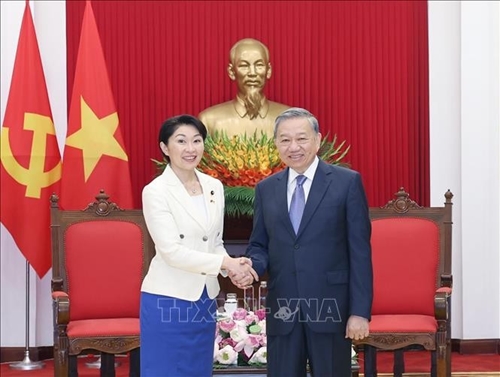    |
 |
|
Party General Secretary To Lam (right) and Chairwoman of the JVPFA Obuchi Yuko |
During a reception in Hanoi on August 7 for Obuchi, who is also a member of Japan's House of Representatives, Party chief Lam hailed the first visit by a JVPFA leader since both countries elevated their ties two years ago.
He suggested Obuchi carry forward the legacy of past JVPFA leaders, including her late father, former Prime Minister Obuchi Keizo, former Chairmen Nikai and Takebe, by maintaining strong support and making active contributions to the development of Vietnam – Japan relations.
Reflecting on the over-1,300-year history of cultural and diplomatic exchanges between the two countries, he expressed satisfaction with the current state of bilateral relationship, saying it is in the period of good, pragmatic, and wide-ranging development, with a high level of political trust, vibrant high-level exchanges, and growing collaboration in economy, labour, education and training, as well as emerging fields like green transition and digital transformation. Locality-to-locality, cultural and people-to-people exchanges are also progressing, he noted.
He praised the delegation’s packed agenda, particularly its presence at an investment promotion event in Can Tho city, which he said would advance collaboration in agriculture and climate change adaptation in the Mekong Delta.
Obuchi recalled her father’s 1998 visit to Vietnam as JVPFA Chairman on the occasion of the 25th anniversary of diplomatic ties. She pledged to uphold his legacy as a new-generation leader, committing to furthering Japan - Vietnam relations as the host suggested.
Impressed by Vietnam’s dynamic growth and the vitality of its people, she expressed confidence in the country’s future, citing its young population, Southeast Asia’s highest economic growth rate, and educated workforce.
Japan backs Vietnam’s reform efforts and expects to stand alongside the country as it pursues development goals in the new era, she said, stressing the need to expand cooperation across a wide range of sectors, not only in politics, economy, trade, and investment, but also national defense-security, and people-to-people exchanges. She committed to close collaboration to advance the bilateral Comprehensive Strategic Partnership into a new stage of development.
She underscored her commitment to strengthening parliamentary exchanges between the two nations’ friendship groups and deepening cooperation in infrastructure, emissions reduction, green transition, and urban rail projects.
The host Party leader, in reply, reaffirmed Vietnam’s consistent foreign policy of independence, self-reliance, peace, cooperation, and development, multilateralization and diversification of external relations.
"Vietnam consistently considers Japan one of its most important and long-term strategic partners that will continue to accompany the country in the new era," he said.
He suggested that JVPFA back the increased exchange of high-ranking delegations and the promotion of national defense-security cooperation. He also urged efforts to further connect the two economies and encourage Japanese firms’ involvement in Vietnam’s key strategic infrastructure and new energy projects, especially those that can serve as symbols of the Vietnam – Japan partnership.
He advocated for expanded collaboration in sci-tech, innovation, and quality workforce training; alongside deeper local-level and cultural exchanges. He sought continued support for the 600,000-strong Vietnamese community in Japan and called for mutual support at international and regional forums, particularly amid the evolving global and regional developments.
JVPFA leaders and members expressed admiration for Vietnam’s reforms under the drastic leadership of General Secretary Lam. They expressed support for further enhancing Japan – Vietnam relations and wished to boost all-around cooperation.
They proposed launching the Japan – Vietnam “2+2” dialogue mechanism involving foreign and defense ministries in 2025, alongside flagship projects like the Vietnam Japan University, infrastructure and energy development, and people-to-people exchanges.
Source: VNA